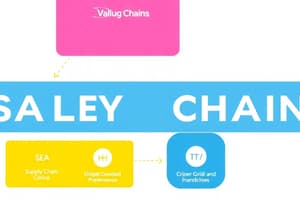Podcast
Questions and Answers
What is the primary difference between reselling and franchising?
What is the primary difference between reselling and franchising?
- Franchising uses another firm's business model for a fee. (correct)
- Franchising requires creating new products.
- Reselling does not involve any costs.
- Reselling is limited to physical products only.
Which of the following best describes gross profit?
Which of the following best describes gross profit?
- The total revenue generated by the business.
- The profit after deducting only direct costs from sales. (correct)
- The net income after taxes have been paid.
- The profit remaining after deducting all expenses.
Which costs are considered factory overhead?
Which costs are considered factory overhead?
- Factory rent, utilities, and equipment maintenance. (correct)
- Marketing expenses and administrative salaries.
- Direct materials and production labor costs.
- Revenue generated from sales.
What does net income before tax represent?
What does net income before tax represent?
In a projected income statement, what information is typically forecasted?
In a projected income statement, what information is typically forecasted?
What is the primary purpose of the value chain in a business enterprise?
What is the primary purpose of the value chain in a business enterprise?
Which of the following best describes inbound logistics?
Which of the following best describes inbound logistics?
What is an indirect type of material in a business setting?
What is an indirect type of material in a business setting?
Which step is NOT part of setting up a business according to the process outlined?
Which step is NOT part of setting up a business according to the process outlined?
What does the term 'operations' refer to in the value chain?
What does the term 'operations' refer to in the value chain?
How is a business model typically defined?
How is a business model typically defined?
What characterizes direct workers in a business?
What characterizes direct workers in a business?
What is meant by 'value/supply chain' in the business context?
What is meant by 'value/supply chain' in the business context?
Flashcards are hidden until you start studying
Study Notes
Manpower
- Direct Workers: Directly involved in the production/service delivery process
- Indirect Workers: Support direct workers (e.g., administration, maintenance)
Materials
- Direct Materials: Directly used in the production process
- Indirect Materials: Support the production process (e.g., cleaning supplies)
Setting Up a Business
- Product Development:
- Prototype: A testable model of the product
- Validation: Assessing market acceptability through customer feedback
- Supplier Selection: Identifying sources for raw materials and inputs
- Value Chain: A series of interconnected activities creating competitive advantage
- Michael Porter: Pioneered the concept of value chain
- Value Creation: Companies aim to create value exceeding the cost of providing goods/services
- Supply Chain: The flow of activities related to producing and selling a product or service
- Customer Request Fulfillment: The ultimate goal of the supply chain
Business Model
- Brick and Mortar: Businesses with physical locations
- Reselling: Businesses purchasing products from others and reselling with/without modifications
- Dropshipping: A reselling model where the seller doesn't hold inventory
- Franchising: Utilizing a proven business model from another company for a fee
Financial Planning
- Forecasting: Estimating/predicting costs and revenue
- Gross Profit: Revenue minus cost of goods sold/sales/merchandise
- Cost of Goods Sold: For manufacturing/agriculture businesses
- Cost of Sales: For service-based businesses
- Cost of Merchandise: For trading businesses
- Factory Overhead: Manufacturing costs excluding direct labor and materials
- Examples: Production supervisor salaries, factory rent, utilities, equipment maintenance
- Net Income (Before Tax): Profit after deducting cost of sales and operating expenses
- Operating Expenses: Marketing and administrative costs
- Net Income (After Tax): Income remaining after paying taxes based on net income before tax
- Projected Income Statement: Financial forecast for the next five years
Studying That Suits You
Use AI to generate personalized quizzes and flashcards to suit your learning preferences.




